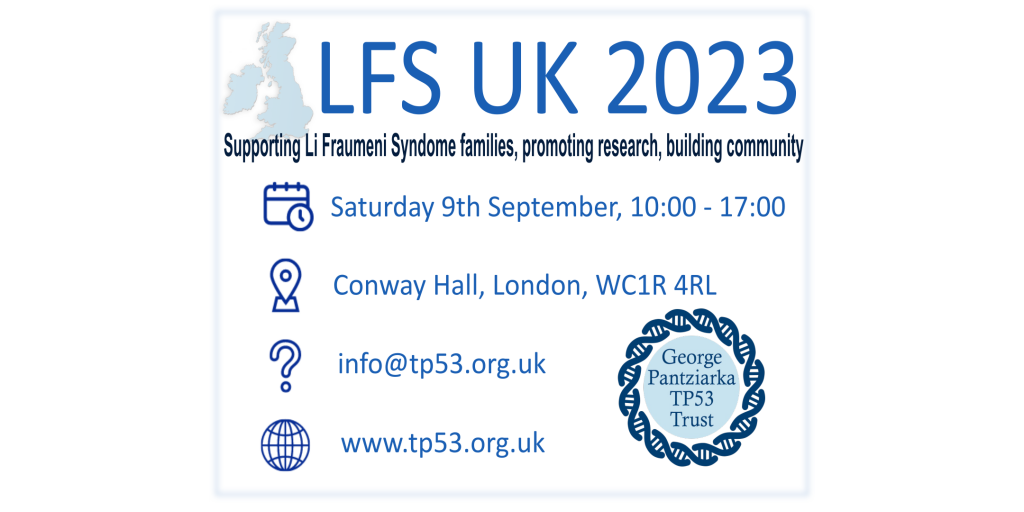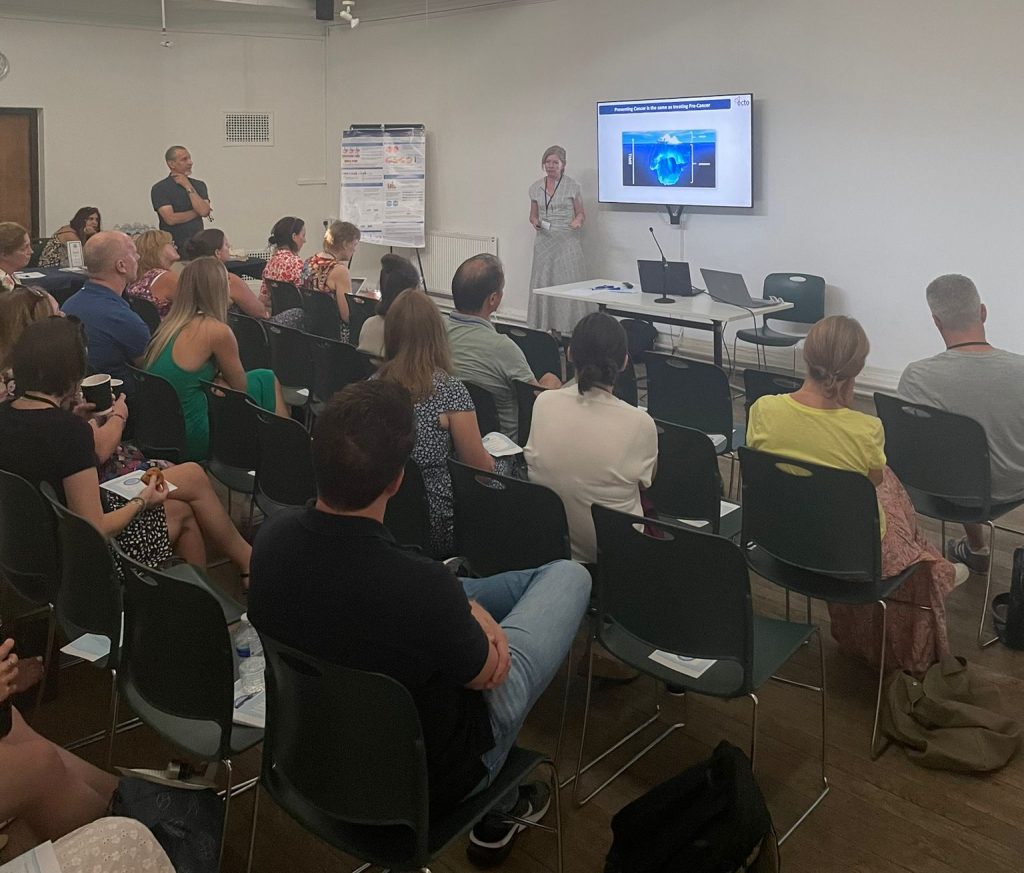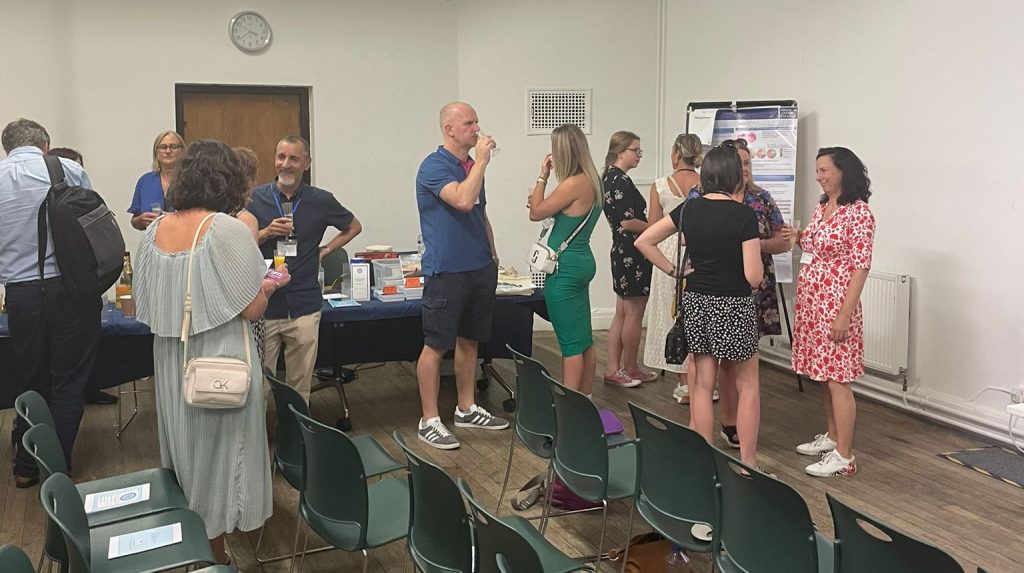LFS UK 2023 took place on September 9th, a scorching hot day this year, at the Conway Hall in Central London. Due to the heat a number of people who had booked contacted us to let us know that they couldn’t make it – but still the attendance was pretty good compared to previous years. After Irene’s welcome and intro, the first speaker of the day was Patricia Walsh, one of our Ambassadors, who talked about the value of science and the ways that it had impacted her life – through her LFS and her husband’s Huntingdon’s disease. Her message was clear – knowledge is power, so it’s better to know than not know.
Professor Sarah Blagden’s talk followed [presentation]. Her topic was the Metformin in Li Fraumeni (MILI) Study, the pioneering clinical trial that will test the anti-diabetic drug metformin to see if it reduces the incidence of cancer in people with LFS. Sarah opened by discussing the pre-cancerous niche – the precursor state that can exist for years before it switches mode and becomes a cancer. The key point being that treating this pre-cancer is the key to preventing cancer. The MILI trial will be using metformin to treat this pre-cancer – and also undertaking biological studies to fully understand how pre-cancer and cancer emerge, whether metformin works to stop it happening and if so, finding out how it works. Additionally the outline of the trial was explained, along with the benefits to participants in the way of screening and whole-body MRI for both the metformin and non-metformin groups.
In a change to the published program, Dr Joseph Christopher, of the Sanger Institute, Cambridge, stepped in for Dr Raheleh Rabari to give us an update to the Li Fraumeni over Time Study (LiFTS) [Presentation to follow]. Generously giving up some of his holiday time, Joseph dialled in to give us a taste of the early findings from the study as well as to remind us of the questions the study is asking – namely, why does cancer risk change over time in people with LFS, why does it have the distinct patterns of cancer incidence that it does, and what factors influence individual risk. These questions are important so that we can manage the risk for people with LFS at an individual level. Next there was an introduction to some of the cutting edge tools that the LiFTS project is using – the laser cutting microscope and single-molecule DNA sequencing. These tools give researchers an unprecendented glimpse into what’s going on in cells – including in ‘mutant patches’, areas of tissue that correspond to pre-cancer niches with high rates of mutations without being full cancers yet. Finally, there was some intriguing data looking at fathers without LFS who have some level of TP53 mutations in their sperm and how this might be related to de novo LFS cases.
Dr Elena Cojacaru, from the Royal Marsden Hospital (RMH), followed with an update on the SIGNIFIED and ICED projects [presentation]. SIGNIFIED is a trial that is looking at the incidence of cancer in people with LFS undergoing annual whole-body MRI (WBMRI). A secondary aim is to produce data on the cost-effectiveness of WBMRI so that it can be rolled out across the whole of the NHS, rather than in some places only. So far 55 patients have been included in the study, and four cases of cancer have been found – as well as a number of benign findings. The ‘Inherited cancers – early diagnosis’ (ICED) study, also taking place at RMH, is looking to use liquid biopsies (blood and urine samples) to detect cancers early. The idea is to compare the findings from these blood/urine samples with findings from scans to see if early detection is possible. A positive finding would have huge implications for the management of people with LFSand other genetic cancer syndromes.
First up in the afternoon was the second of our ‘Voices of LFS’, Nina Irwin, who described her LFS story from initial breast cancer diagnosis in 1993 to LFS diagnosis at second breast cancer in 2016 to participation in the SIGNIFIED study in 2022 [presentation]. The first SIGNIFIED scan detected a lung tumour at a very early stage, enabling it to be surgically removed without the need for chemotherapy. Without SIGNIFIED, this would most likely have been undetected until it was too late to be treated. However, the second WBMRI has also detected something, and Nina described waiting for surgery for this too. It could be, as she pointed out, that SIGNIFIED has saved her life twice.
A downside to WBMRI is that it can also show lots of odd ‘lumps and bumps’ that are not cancers at all. These are called ‘incidental findings’ and was the topic for Dr Madeleine Adams from the All Wales Paediatric Cancer Predisposition Service [presentation]. Drawing on data from the relatively new service, experience in the last 3 years shows that 8 of 15 (53%) WBMRI scans had included incidental findings, whereas 2 of 22 brain MRIs (9%) had included such findings. None of these findings had turned out to be cancers. It was also clear that such findings could be expected particularly on first scans, and the service had now included a warning about this to new patients.
The last speaker of the day was Dr Emma Woodward, from the Manchester Centre for Genomic Medicine, presenting on the topic of North of England LFS Clinical Care and Research [presentation]. The challenges of service delivery, including the provision of whole-body MRI and the surveillance protocol in place were all outlined in the first part of the presentation. In the second part the focus was on the research side of things, with Manchester having an incredibly strong track record for LFS. Liquid biopsy and early detection are a current focus, particularly using ctDNA technology to pick up signals from blood tests in the ATLAS project.
Thank you everyone for making me feel welcome at my first event. Nice to meet people and the work by the medical professionals who presented is incredibly humbling – thank you for you passion and commitment x
Lisa Scottie
This year we also had the first poster presentation – Oxford University PhD student Hannah Fuchs presented a poster on her research on p53 auto-antibodies. There was a lot of interest, and Hannah had the perfect opportunity to explain her work to multiple people during the day. It was much appreciated – and we hope that we can repeat the exercise in future years – so if you are a PhD student please get in touch!
All contributors were very informative speakers and it really feels like we’re getting some weight behind the LFS community and building real momentum towards being able to make a massive difference to the outcomes of those of us who have it. The gravitas of the clinicians involved in the trials and research is first class! We just have to hope the level of care and screening available to some, geographically, can be put on a level playing field across the country. Great work!
Chris Stevens
Overall, it was an incredibly uplifting day. Alongside the formal presentations, the conference is always a fantastic social event – we had people with LFS from all over the country. Some were old friends, but also some attending for the first time. It was great to see so much interaction and networking going on – and sets us up for the year ahead.
It was truly heartwarming to see families coming together, joined by dedicated medical clinicians who shared valuable insights about the numerous LFS studies underway.
Michelle Brady
Finally, we are grateful to the Addie Brady Foundation and to Bamboo Loans for financial sponsoring the conference – their on-going support is much appreciated. Thank you!



